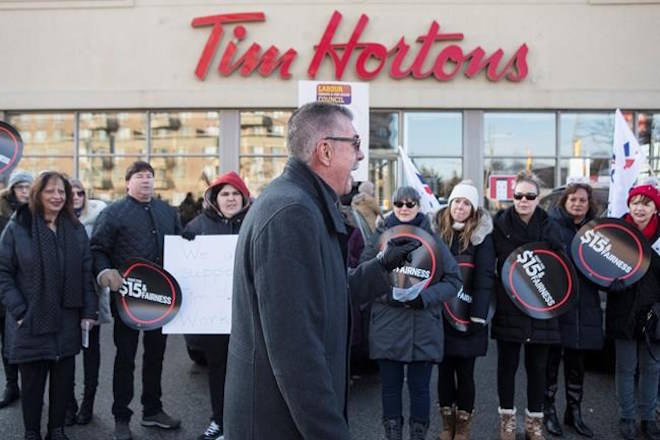Labour organizations across Ontario are holding rallies today to protest the actions some Tim Hortons franchises have taken in response to an increase in the province’s minimum wage.
Since the rate rose to $14 an hour on Jan. 1, several franchisees have announced they’re reducing employee benefits and eliminating paid breaks.
They say doing so is a necessary measure to help offset the added costs of the minimum wage increase.
But labour groups describe the company as “wildly profitable” and argue Tim Hortons and its parent company can afford to pay employees at the new rate without taking away previous perks.
Protests have been scheduled at more than a dozen Tim Hortons locations across the province throughout the day.
Organizers say they hope the rallies will send a message to Tim Hortons and its parent company — Restaurant Brands International.
“Head office has the means to ensure that these reprisals against workers are reversed, and we are calling on them to do so immediately,” said Pam Frache, Ontario co-ordinator of a campaign for higher minimum wage dubbed Fight for $15 and Fairness. “And we are not going to stop, actually, until they make this happen. We need to make it right for these employees.”
The rallies come a day after a social media campaign sprang up encouraging people to boycott Tim Hortons in order to show solidarity with the workers.
The campaign urged patrons to take part in “No Timmies Tuesday” on Jan. 9 and instead visit independent coffee shops.
Protesters have said they want the boycott to put pressure on the corporation and franchisees to reintroduce the scaled-back benefits.
But who should take responsibility for that is at the heart of the latest round of finger-pointing in an ongoing blame game between some franchisees and their corporate parent. They have publicly sparred over alleged mismanagement and filed several lawsuits against each other in recent months.
Tim Hortons has said individual franchisees are responsible for setting employee wages and benefits, while complying with applicable laws. But some franchisees argue the corporation, which controls prices, should help owners grappling with the mandated wage hike.
The Great White North Franchisee Association, which represents half of Canadian Tim Hortons franchisees, said the minimum wage hike and other changes to the province’s labour laws will cost the average franchisee $243,889 a year.
The association said it hoped Restaurant Brands International would lower supply costs or raise prices. When it did not, the association said, many franchisees were “left no alternative but to implement cost saving measures in order to survive.”
Tim Hortons fired back, saying such cuts “do not reflect the values of our brand, the views of our company, or the views of the overwhelming majority” of restaurant owners. The chain called the cuts reckless and completely unacceptable, adding staff “should never be used to further an agenda or be treated as just an ‘expense.’”
Michelle McQuigge, The Canadian Press



